#and if youre not youre in denial
Explore tagged Tumblr posts
Text
Eddie posts a Tiktok of Steve laying in bed. His eyes are shut and he has on one of those cooling gel eye masks. Eddie is zooming in and out on his face. He’s quiet for a second and then asks, “Steeeevie?”
Steve: I’m fine
Eddie: Do you have a headache?
Steve, for the hundredth time: No
Eddie, in a sing-song as he zooms in on the moles on Steve’s neck: I don’t believe you. This isn’t my first rodeo
Steve: You’ve never been to the fucking rodeo
#Steve likes to live in active denial that he’s getting a migraine until he literally can’t#this video was filmed at like 6AM and Steve has every intention of going to work#Eddie’s already texted his boss so fat chance that’s happening#this isn’t Eddie’s first time being in this situation and he’s learned a long time ago that you can’t give in to Steve’s puppy eyes#or you’ll be picking him up from work an hour later and he’ll throw up in your car#steve harrington#eddie munson#eddie munson tiktok saga
1K notes
·
View notes
Text


Did Wade really think that Logan was going to let him do this? All alone?
This was the very moment when realisation came crashing down on both of them that they wouldn't be able to live without each other. So, they saved the world together and in turn saved their souls.
#the idiots in love needed a push#this very incident forced them to get out of the denial stage#they're so perfect together#deadpool and wolverine#deadpool 3#poolverine#deadclaws#loganpool#wade wilson#james logan howlett#old man yaoi#imagine your otp#otp prompts#writing promt#marvel memes#mcu meta#ryan reynolds#hugh jackman#spirk#spock x kirk
2K notes
·
View notes
Text
”who me? couldn’t be!” - dialogue for those in denial about their feelings
prompt list by: @novelbear
"are you crazy? they're not my type, you know that."
"i don't have time for a relationship." "that has nothing to do with anything i just said. like at all."
"they're annoying as hell, no i don't have feelings for them."
"i honestly don't even know who you could possibly be referring to."
"what if i told you i said those types of things about everyone? then what?" "i would really hope you didn't. oh god."
"i do not want to see their face, hear their voice or their name for that matter. stop talking about them."
"what gave you that idea?"
"why does everybody keep saying that?"
"it's just been a while since i've had a close friendship like this, that's all."
"no.....no."
"i wasn't blushing! it was hot out." "it is literally snowing outside as we speak are you joking."
"i don't even like them like that i don't know what you mean."
"i'd do that for anyone!"
"flirting? me? i wouldn't say i was."
"cut it out, i'm tired of hearing you guys tease me about this."
"that's not true, where did you hear that from?"
"they're just a friend. that's all."
"we've been friends since we were little, we're practically siblings! no!"
"love?! you think i'm in love?"
"i know what having a crush feels like and this is nothing close..." "have you considered that it's because this is more than just a crush?" "stop talking."
#otp prompts#writing prompts#imagine your otp#otp writing#writeblr#prompt list#dialogue prompts#writing dialogue#otp#denial prompts#prompts#writing#request
4K notes
·
View notes
Text
One of the philosophical/theological differences between judaism and other religions is how we conceive of the consequences of doing bad things.
I just heard someone say, "well jews don't believe in hell, so why don't you-" and just never sits right with me that the only thing that could prevent you from acting in bad ways are the threat of an eternal punishment. The implication that you shouldn't care about the consequences of your actions on the worldly level are astounding as well.
I care about not doing bad because it hurts people - myself included. Even if I did believe in hell... It wouldn't factor into how I live life. I fundamentally don't agree that we should treat this life and this world as a temporary home - a rest stop - where our actions only matter insofar as it affects where you go in the afterlife.
#jumblr#personal thoughts tag#i think that's also why you have apathy from people about things like climate change and social issues#because if you think of this life as a short stop to Eternal Bliss™ you don't NEED to care about the material world#in fact you'll just distract yourself from earning your spot in Eternal Bliss™#and the people who DO care about the Worldly Things are just in denial about jow much they want Eternal Bliss™#obviously that's a generalization of a mindset that i have seen before that not everyone will believe in#the only thing i feel the need to believe in is g-d and that He wants me to LIVE g-ddamnit
913 notes
·
View notes
Text


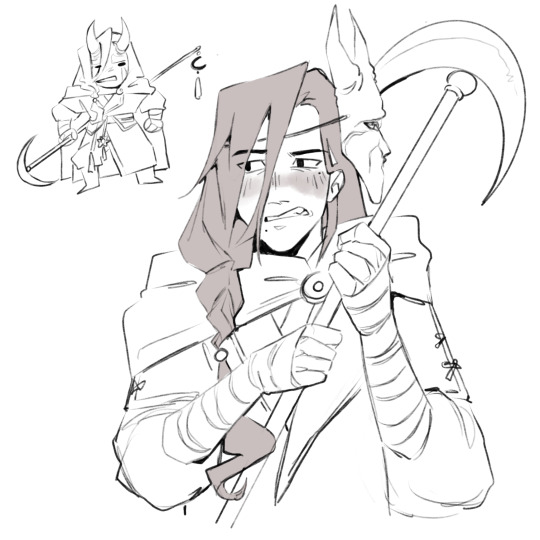

minimum wage coded scrunkly and his very good pupper
#.... I am in denial over vol 7 don't mind me ywy#haven't had the chance to get to vol 8 yet so no spoilers pls not that I'm expecting much :')#anyways yin yu my poor scrunkly I'm sorry that the narration and xie lian keep judging your overworked ass#they're both very fun to draw tho#tgcf#tgcf fanart#mxtx#tian guan ci fu#quan yizhen#yin yu#quanyin#heaven official's blessing#my art
2K notes
·
View notes
Text
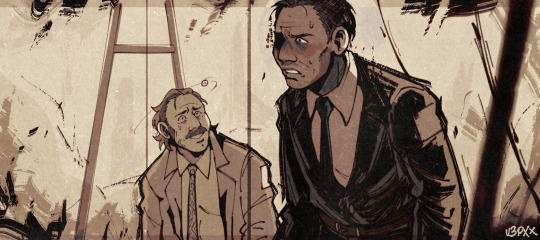
KIM KITSURAGI - “Is that. My kineema.”
COMPOSURE [Medium: Success] - Something in him is about to break, *big time*.
EMPATHY - And it’s not going to be pretty, do something!
- DRAMA [Formidable] - Everything is fine!
- “Sure is.”
DRAMA [Formidable: Failure] - Surely he’s aware that he’s not the *only* person in the world who owns a Kineema?
YOU - “Is it really *yours*? I mean, plenty of people have their own Kineemas, right? Like working men, government offices, uh, firefighters I guess, maybe even animal control people? Exactly! A million different people who could’ve driven it into the uh…”
DRAMA - Pause, my liege! Ixnay on the Ineemakay!
YOU - “It could even be our *mysterious* joyrider!”
KIM KITSURAGI - Your frenzied babbling falls deaf to the lieutenant's ears. Instead, he approaches the broken vehicle, sunken in the ice. He moves with a caution and gentleness you haven’t seen him display before.
INLAND EMPIRE - It must be cold and lonely down there, in the icy water. Maybe he could sense its sorrow, calling to him…
PERCEPTION (SIGHT) [Easy: Success] - His hands, which are always stiffly placed behind his back, are trembling.
ENDURANCE - This is the shuffle of a tired, tired man.
HALF LIGHT - He’s going to do something drastic because of you. Oh god, terrible! You’re a terrible liar! You can’t look at this, you just can’t!
VOLITION [Formidable: Success] - It's not *you* who drove his kineema into the sea. You have plenty of faults, but this one is decidedly not yours.
KIM KITSURAGI - He kneels down with his head bowed, casting his face in shadow. He plants a hand on the ice to stabilize himself, squinting to get a better view of the motor carriage. “Detective, it says ‘57’ on it.”
YOU - Sweat drips down your brow, and you feel a terrible headache coming. “Maybe our joyrider has an affinity for that number?”
LOGIC - He's not stupid, he knows that it's not that.
KIM KITSURAGI - “57.”
YOU - “What about 57?”, you brace yourself.
KIM KITSURAGI - “Precinct 57.”
YOU - You wince. “Kim, look-”
KIM KITSURAGI - “When I woke up in the Whirling-in-Rags with no memory of what happened during the days before, I've taken note that something of mine has gone missing.” He grits his teeth. "A very. Important. Something."
He runs his hands over his face, messing his already unkempt hair in the process. Regret creeps up on his features. “God. Fuck. They’re going to fire me over this, they’re not going to hear me out.”
EMPATHY - Desperation settles in the lieutenant's tone. Sadly, you find yourself in agreement, even if you don’t want it to be the truth.
YOU - “People are more valuable than machines, Kim.”
KIM KITSURAGI - “Not people like me.” He rasps.
YOU - “…”
KIM KITSURAGI - Before you can say anything more, you fail to notice the lieutenant carefully walking onto the edge of the ice. He looks over the frigid water, a dizzying blue that mirrors and distorts his exhausted face back to him.
YOU - “Kim?”
KIM KITSURAGI - Seconds pass as he looks to be contemplating something. Out of nowhere, he casually takes another step where the ice ends and the sea begins. It happens all too quick for the lieutenant to even voice a call for help— if he even wanted to — his body plunging into the cold water before your eyes.
YOU - “KIM!!!!”
uhhh bonus stuff? sorry i have swap au brainworms pfttt
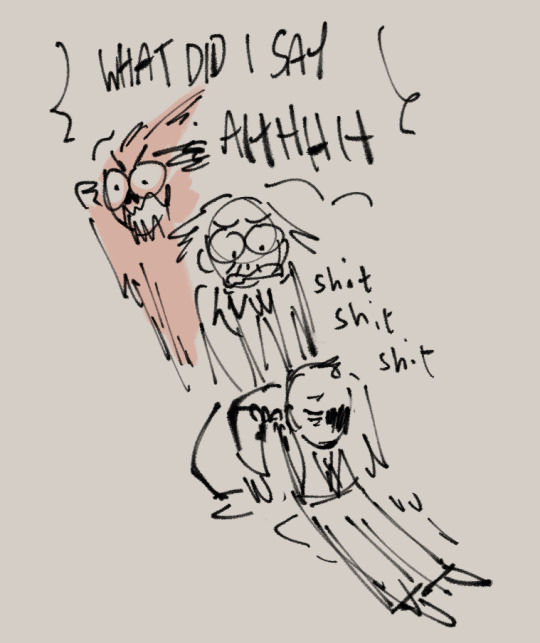
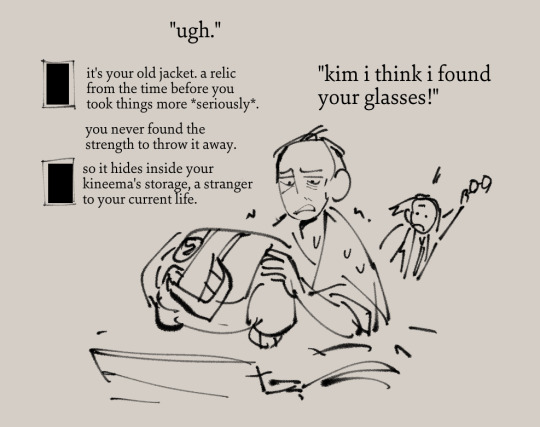
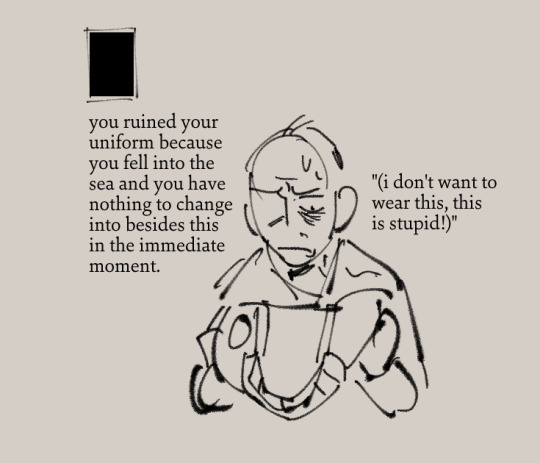
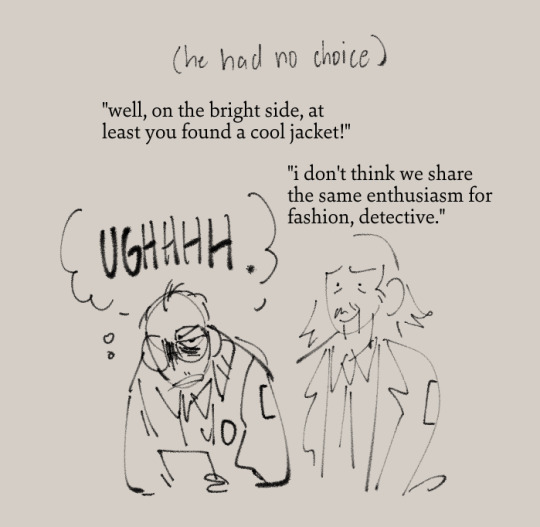
(im not sure what skills kim has at the moment so rn he only has narration as his inner monologue ok whoops, i would like to keep harry as the guy who thinks in dialogue trees so im still figuring it out pfttt)
also, this was done bc i wanted to expand on these old scribbles of mine, just like an idea, i just think that he'd be having an even worse time wheezes
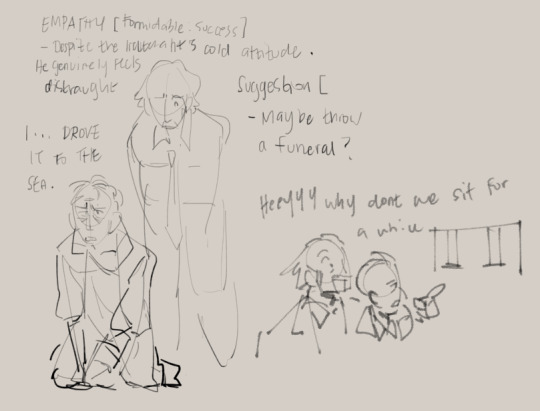
#disco elysium#kim kitsuragi#harry du bois#den's disco swap#disco elysium role swap#HI nobody look at the fact that. i am a novice writer at best DFGHJFGH#i had idea for some comic dialogue but it ended up being this instead whoops. i mean i could still draw this as a comic#anyways. i was like. trying to reverse engineer my idea of how kim can change into his bomber jacket instead of his uniform.#which. i dont think you can do with just simple convincing bc that thing is fused to him in spirit so there has to be like a good reason wh#oh it gets ruined! how? it gets like wet or smth! how'd that happened? he threw himself into the sea#also isnt it fitting that my memory problems is making me not remember the things that happen in disco elysium very well wheezes#so whoops if the characterization is a lil off lmaoooooo#but i have been trying to figure out how i want harry to be in this swap au#i dont think he's as well as he wants you to believe he is. and just the image of him pushing this 'youre allowed to be in denial about +#this' to kim about the kineema was so vivid in my head and idk if that tracks but hell. its in there now dfghdjfg#sunnysidedraws#sunnysidedisco
2K notes
·
View notes
Text

There's the 8th and last! *Pant* I *pant* need a nap 😴
@queendestiny6912
@sissyloren @xxsissycaitlynxx @incognitoelizabeth @cutieecassie @bambimandi @bambibreanathebarbiebimbo @pfp-of-karlie-xcx-ha
#queendestinycaptions#queen destiny owns us#queendestinyharem#bimboification#bambification#bambi#beta#permanent slave#panty sissy#beta sissy#pussy free#permanent denial#permanent feminization#permanent sissy#sissy gurl#sissy bitch#sissy girl#sissy tasks#feminization captions#humiliation sissy#sissifeminine#sissi femboi#feminine sissy#humili sissi#sissy cd#give up your manhood#manhood is not for you#forced crossdressing#bimbo doll#sissy doll
689 notes
·
View notes
Note
Happy late birthday, it was a wonderful post you made, I just gotta ask something outta the silly.
Do you think it's as cute as I do, the idea of moon having a second nightcap that's party hat coloured and he swaps that on for birthdays
@sea-menace Dream big, my friend! Why stop at 2 nightcaps...? >:}
We got some seasonal caps:

Modern day AU, where Fazbear Co. runs a content farm TikTok account; and Moon is horribly out of touch with gen alpha humour (because no one bought the animatronics internet plans 🥲) caps:
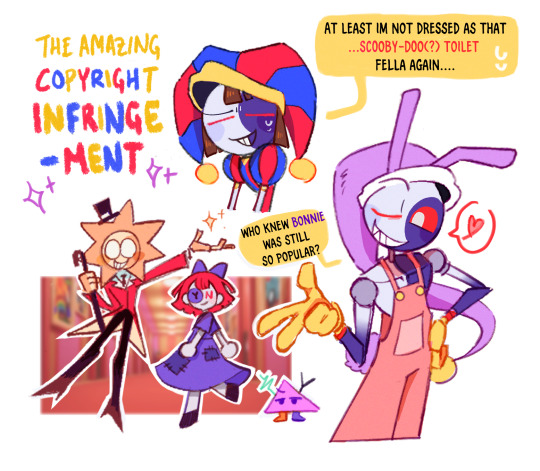
And @lavenoon's jaw-dropping, heart-stopping, amazing Accidentally Undercover fic caps! ✨

Pretend that Agent Dusk lost his original nightcap in a deadly shootout with a rival spy team and he needs to whip up a replacement PRONTO before he loses all street creds (He still won of course, but at what cost,,,,)
#But seriously thank you for the ask friend; you've singlehandedly brought me out of an art slump 💖💖💖#There is an AU in which Moon fully knows how to use the phrases “Skibidi Toilet” and “Sticking your Gyatt out for the Rizzler”#But not in this AU I will not allow it 🔫👁️👁️#“Sun is my favourite” I cry with tears in my eyes while I pumped out 9 consecutive Moon drawings (in denial)#Shoutout to Tumblr sexymen Spamton G Spamton and Lucifer Morningstar for teaching me about the appeal of men in suits adhsjdklasf#fnaf sb#fnaf security breach#dca fandom#dca au#fnaf moon#moondrop#y/n#my art#my ask
1K notes
·
View notes
Text
the most deviant-like thing I've ever heard.
#denial is a fucking river in egypt#detroit become human#come to your senses before I have a seizure dude#connor rk800#dbh#dbh connor#hank and connor#rk800#hank anderson#deviant connor#still love him tho
903 notes
·
View notes
Text
Ideology of Exceptionalism and Gravity Falls; meta and character analysis

I had a whole ago read a post by @icanlife that had a quote by Alex Hirsch on Ford's greatest flaw, and wanted to explore what the flaw is, which is the ideology of exceptionalism; in the exploration, I’ll touch on what it is and how it is used in abusive relationships and cults, as well as how it drives multiple Gravity Falls characters and consequently how it impacts relationships between these characters, and how the show ultimately refutes exceptionalism.
Quick note here; I am not in any way, shape or form a psychologist nor have any formal training in psychology; this is written from my own experiences with this ideology and my own forays into psychology and trauma-informed learning. It is also written with a loose understanding that is likely not broad enough to cover all references to cults, extremist groups and abusive relationships.
The Ideology of Exceptionalism
First of all, we have to get through a drier bit, which is… what is the ideology of exceptionalism and how does it arise? Might be fairly obvious, but it is the belief that you are, or belong to, a group of exceptional people, thus more important and worth more than anyone else; ie, those who don't qualify as 'exceptional'. It is often a subconsciously learned ideology. Now, what qualifies one as exceptional can be extremely varied; generally it revolves around something that provides some form of privilege. Thus, it might be, as the main exceptionalist idea in Gravity Falls, 'intelligence', or power, or it can be such things as attractiveness, quantity of money one has, species, nationality, or skin colour and ancestral heritage. The ideology of exceptionalism, being by nature hierarchical, devalues, and at its worst, openly and violently dehumanizes those who do not qualify as exceptional.
For why exceptionalism occurs is an extremely broad topic, but I've personally found that, for exceptionalism revolving around intelligence, it's a result of a poor sense of self-worth, and having one's self-worth tied to what makes one exceptional. Poor self-worth itself (again, broadly) is a result of childhood trauma from a lack of positive affirmation and unfulfillment of the emotional needs of the child. Meanwhile, self-worth becoming tied to the quality of exceptionalism generally is a result of when positive affirmation was pretty much solely provided around their 'exceptionalism', especially when provided derogatory commentary, or a blatant example of how they would be treated if they aren't 'exceptional'. As a result of the general lack of affirmation, self-worth then becomes often solely reliant on the qualities of exceptionalism, as that is the only way for the child (and later, adult) to get affirmation of their worth, as well as out of fear of being ‘not worth anything’ like the examples of ‘non-exceptional’ people they have been given.
This is especially likely to occur when the child is a social outcast; the adoption of the hierarchical ideology of exceptionalism, and the devaluation/dehumanization of others often occurs subconsciously as an avoidance/minimization tactic from pain. This is to say, the child, and later the adult (if healthy self-worth is not established) goes 'it doesn't matter what the non-exceptional people say or if they accept me since I matter more than them because of my exceptionality'. It can even be taken further, that being shunned is part of one's exceptionalism, and becomes part of the qualifier of being exceptional. For instance, 'they just can't understand because they aren't exceptional and that's just a part of being exceptional'. This idea also neatly tailors into the part of the concept of being better then others means you are separate from others; this can be taken that someone who is special, needs to be alone to be truly special.
Obviously, exceptionalism is not a healthy coping mechanism for poor self-worth, as often such people constantly feel the need to prove and show off their exceptionalism to gain that affirmation and avoid rejection, which is stressful. As well, it often negatively impacts their relationships with other people as a result of the arrogance of believing that they are better than most others, or even deliberate sabotage due to their arrogance. This occurs as they flatten the complexity of human experience to black-and-white hierarchical categories of exceptional/not-exceptional through constant judgement of those they meet, and often refuse to engage with people who don't belong to their 'exceptionality', or even people they simply don't like, even if they technically qualify. Generally, those that they do like or have close relationships with, often due to being similar, are automatically labelled as 'exceptional'. Those judged as ‘exceptional’ also become privy to the open judgements of ‘non-exceptional’ others, out of a subconscious belief by the exceptionalist that the other believes similarly; something that may strain their relationship if the other doesn’t ascribe to exceptionalism. This all culminates in the exceptionalist being blind or even adverse to the diversity of experiences, which makes it difficult to create relationships and community outside of echo chambers of their own beliefs (if they can even find this), and subsequently, these people are often isolated and have very few to no close relationships with people.
However, all humans require connections with other people, relationships where one can rely on others emotionally and physically if needed and feel accepted; they also require to feel like they are worth something, that their life has meaning. Lacking meaningful connections and having a crippled sense of self-worth, a deep yearning hole is left in these people. Exceptionalism, especially as it is a narrative constantly pushed by Western society as it validates hierarchies, is then employed as a (often subconscious) trauma response to assuage this yearning hole, with arrogance and denial. And depending on the circumstances, it can be a very strong and definitive trauma response for people.
This isolation and lack of self-worth is catnip to abusive relationships, including cults and extremist groups. These types of relationships often heavily rely on isolating their victims or pulling them into echo chambers of solely the abuser’s rhetoric, to redefine what is healthy through gaslighting; as the exceptionalists are already isolated, this makes them extremely susceptible. They also often provide these people affirmation, and in these cases especially about their exceptionalism, thus confirming their self-worth, their 'specialness', while also providing them the connection they have been lacking, either through the cult community or through the abuser’s own presence. These emotional needs, which haven’t been met in a long time, if ever, begin to be fulfilled; something that abusive relationships and cults hinge on, rather than any form of logic.
Ideology of Exceptionalism and Gravity Falls
The main characters within Gravity Falls which are heavily ascribed to exceptionalism would be both Ford and Bill; this characterization deeply impacts the story and their relationships with others (technically the Northwest are another case regarding wealth, but less directly impact the storyline and thus tangential; Gideon also is an example, but as a mirror of Bill). With each of these characters I’ll go into detail within their sections on the way they began to ascribe to exceptionalism, and how it plays out later in their relationships; I will first begin with Ford, then move to Bill. Then, to cap it off, I’ll go into the characterization of Stan and the way Gravity Falls refutes exceptionalism.
Ford and Exceptionalism
Firstly, the quote from Alex Hirsch that kicked this whole baby off, as mentioned previously;
“Ford sees Dipper as someone who’s special like himself. That’s Ford’s great flaw, his arrogance is he believes that there’s special people, and everyone else. That human attachments are actually weaknesses. And the song and dance that he’s giving Dipper right now, is the song and dance that he gave McGucket, back when they were younger… ‘You and me are different, we’re better than everyone else. We have a path that no one else can understand, and only us can do this.’ It’s a very seductive idea for Dipper… Dipper is a smart kid, but Ford’s projecting. Ford loves Dipper because he sees someone who’ll tell him ‘yes’ to everything. Who’ll never challenge him, who’ll do a really insane dangerous mission.”
Very blatantly Alex Hirsch calls Ford out on his arrogance in the belief that he is special, in his belief in the 'lone hero' complex, in his belief in exceptionalism. And really, it should be no surprise that Ford does so, considering the way he's depicted as a social outcast as a child (other than Stan), and the way his parents have been clearly shown to be not particularly emotionally supportive (“I’m not impressed”); they don't provide positive affirmation except for his intelligence (mostly due to the possibility of money making through it…), while also actively comparing him to Stan who is derogatorily ‘not-exceptional’, and ‘worth less’. This all sets Ford’s self-worth up to be fragile, and other than Stan who wholeheartedly accepts him, he is isolated and invalidated; plus, the only other validation he receives is around his intelligence. All very classically fitting the profile for exceptionalism.

Image id: Stand and Ford when they were children, both clearly enjoying each other's company.
Ford’s belief in his exceptionalism catalyzes after the shattering of his and Stan’s relationship. Previously the twins are shown to do everything together, having a very close caring relationship; something unlikely if Ford thought he was better than Stan. Also, when Ford is talked to about his opportunities, Ford looks uncomfortable at the way they talk about Stan as inferior, compared to how he himself is being praised; but in the offer he’s simultaneously finally being validated, he’s being told he’s someone worth something, and he’s going to be someone worth something after this. And then the science fair incident occurs, and Ford loses that validation from his parents, from the judges and a future of more validation; after being promised validation and acceptance, it slips through his fingers. And in his anger of being denied that, it becomes easy to begin to slip subconsciously into the rhetoric the others have been feeding him; that he’s exceptional, that Stan isn’t, and he deserved to be recognized for his worth. So he breaks the relationship with the only person who accepted and validated him for who he is. With that loss of previous support, Ford becomes then deeply obsessed with proving his exceptionalism to the world to assuage that fragile self-worth, to become accepted, or even better, revered, confirming that he is someone of worth, someone special, like he was promised.
Ford’s obsession also doubly functions as a way to alleviate his guilt over shattering their relationship; if he’s exceptional as he believes, then he’s within the right to respond the way he did, as he’s worth more than Stan, he's better off alone, and he has a right to be angry over being denied that validation. As well, in much the same way as it is used as a way to alleviate his guilt over the end of their relationship, it is also likely used in a way to minimize the pain of being ostracized (although not directly depicted); afterall, Ford’s keenly aware and insecure about his social ineptitude and his six fingers as things that make him different from other people, case in point with his experience visiting Lazy Susans Diner. Thus it wouldn’t be unsurprising if he uses the idea of being worth more than those who ostracize him to imply it ‘doesn’t matter’ what they think. His ostracization by nature keeps him from generally forming close relationships, with the exception of Fiddleford (who much like him, is socially outcast, and intelligent) during his university days. As a result, he's isolated and acutely lonely, having lost Stan.

Image id: One of the missing Journal 3 pages in TBOB, detailing Ford's botched social interaction in Lazy Susans Diner. In the background is the print of his six-fingered hand.
In his obsession over being acknowledged, Ford, like many others who believe in exceptionalism, identifies strongly with the causes of his ostracization (his intelligence, his six-fingeredness) as part of, or wholly, makes him exceptional. It is obvious through his choice of study; with the grant he has been gifted, he chooses to revolve his work around the weird, the outcast, something that you see Ford gravitate towards being an outcast and deemed 'weird' himself (which in Journal 3 he openly talks about). Something that can be, much like him, framed as 'exceptional'. His work is even recorded in a journal that Ford deliberately chooses to put his six-fingered hand on the cover of. Intertwined with the way it becomes adopted into the idea of exceptionalism, is the keen loneliness from his ostracization and a deep desire to be accepted and a wish to find a community of other weird people.

Image id: Two pages from journal 3, labelled 'Myself', in which Ford is open about being weird, and a social outcast, while also noting his ambitions and that 'Gravity Falls, [is] the place that I fit in.'
Ford and Bill
All of this culminates in Ford becoming an incredibly easy target to manipulate by Bill. He’s desperate to be acknowledged (and thus accepted) by an authority figure so that his belief in exceptionalism is justified and his self-worth confirmed. And he knows he’s intelligent, that he's exceptional because people have told him so, but he just needs to prove it with something that shakes the world. And the grant is finally his second chance after the fair, but he's stuck, and the research is going nowhere, and he's in a town where he doesn't really know anyone and he’s so terribly lonely. And sure, he clings to his exceptionalism but if he can't even prove it then is he really exceptional? Is he even worth anything like he thought he was? And what about what he's left behind, rejected, because of his exceptionalism?
And THEN he finds an incantation and he ignores the warnings because maybe, just maybe, this will be his break to get that acceptance/validation he has been chasing his whole life?
And then it's better than that.
A god, essentially, shows himself to him, an ultimate figure of authority. And he tells him that yes, he is special, he’s worth more than other people, and Bill’s only showing himself to Ford because he is so much more intelligent than anyone else. Ford is suddenly getting his exceptionalism confirmed by a god of ancient knowledge, an immensely intelligent interdimensional being, and he’s also showering him with affirmations, specifically affirmations around what Ford's fragile self-worth is based on. And even better, he's delighted by Ford's six-fingeredness; he's not put off at all, it even becomes his main nickname for Ford, just like it used to be for Stan all those years ago. On top of it all, Ford's own social ineptitude doesn't phase Bill, another thing Ford is self-conscious about; Bill's own social ineptitude as he's not human probably makes Ford feel comfortable, knowing that's not expected from him.
Through Bill, not only does Ford find someone who validates his self-worth through intelligence and even confirms to him that his weirdness is part and parcel of making him special, he also finds someone who he regularly (generally) is in contact with, who enjoys talking to him and even banters with him familiarly. Hell, Bill even deliberately goes out of his way (literally possessing a whole wack ton of rats, then dream karaoke) to celebrate his birthday with him; how long do you think Ford has simply skipped his birthday since he had no one to really celebrate it with? The loneliness, beneath his arrogance and belief in exceptionalism, is being fulfilled; for the first time since Ford was a teenager, he's fully accepted by someone, social awkwardness, six fingers, exceptionalism and all.

Image id: One of the lost pages from Journal 3 in TBOB, the 'one thing led to another' page, with Bill and Ford singing karaoke and drinking together, both clearly enjoying themselves; Bill has an arm slung around Ford's shoulders.
So it's really no surprise at all that Ford fell for this, hook line and sinker. Hell, if I was in Ford's shoes I would fall for it just as hard. And I've seen a few posts floating around talking about how Bill is bad at manipulating, and no, he's not. He was able to pinpoint exactly what Ford wanted and needed, and provided that, was charismatic enough to provide that. Again, manipulation isn't about logic. It really isn't; it's about the emotional core in people, what people lack and what you can give them to slowly reel them in to sing your dance and song. And people will ignore vast swaths of red flags when you're finally being accepted, when you're finally getting your emotional needs met at least in some way or form. It's better than not having them met at all, such as previously. So Ford worshipping Bill is really not a surprise, especially as Bill deliberately stoked it.
All of this is part of why you see Alex Hirsch call Ford's belief in his exceptionalism his greatest flaw; because it allowed him to be very easily manipulated by Bill, and by its nature kept Ford isolated from others, evident by his arrogance in assuming he knows best and refusing to see other people who aren't as 'intelligent/weird' as him as worth getting to know, listen too and even reach out to ask help from, it's him believing he has to be the lone hero as someone whose 'special'. It's something that blinds him to the danger of his work around the weirdness of gravity falls because he’s desperate to seek a place where he and his weirdness belong, and it's something that plays out in each and every relationship he has because it's something he clings to so deeply. It's what cost him his relationship with Stan, who previously accepted him completely, and, as he's disinclined to form new relationships and as Bill actively strokes his paranoia (Trust No One…), ultimately further increases the hold Bill has over him. It's only Fiddleford’s presence as he works with Ford that allows him some form of outside reference and reprieve from solely Bill’s influence, something that Bill resents deeply and is clearly jealous and angry about, even if Fiddleford is helping create the portal. And it's ultimately Fiddleford, once he was aware enough of what was happening, calls Ford out on it, seriously jeopardizing Bill's influence over Ford; but Ford is too invested in the portal, in chasing his own ambition and caught up in Bill’s manipulation to take him seriously, until the incident with the trial, and Ford beginning to hear other voices then Bill.
Ford’s Exceptionalism and Wider Relationships
Now back to how it plays out in all Ford's relationships; we've already gone over it with Bill's influence, because it made him extremely easy to manipulate, and with his disregard of Stan in favor of validation of his exceptionalism. But Ford, as pointed out by Alex Hirsch, also exerts the ideology's seductive rhetoric to both Fiddleford and Dipper (who look up to Ford) in a similar way that Bill does with him (although there is a difference of it being used intentionally and maliciously, compared to subconsciously and earnestly, even if it is problematic). Ford, with his black-and-white view of exceptionalism, sees both Fiddleford and Dipper as people who are like him; 'exceptional', and so he treats them as such, and uses this rhetoric to coerce them into helping him.
For Fiddleford, the lure is how he can change the world, how he can be finally acknowledged if he helps Ford with the portal. And it works well; he willingly chooses to leave his own work and his wife and young son, to work with Ford. Much like Ford, Fiddleford himself is also a social outcast and regularly presumed less smart than he is, and he’s got a chip on his shoulder to prove himself, to gain acknowledgement and recognition from the world at large. Although Fiddleford has a family which presumes he’s not entirely lonely like Ford is, he also clearly has deep feelings for Ford, some which are hinted to be more than just ‘friendly’ feelings; it is likely the combination of the lure of validation and spending time with Ford, a kindred spirit that accepts him and an old friend/crush, that causes him to agree (afterall, it was Ford who made Fiddleford feel accepted and choose to stay at Backupsmore). And Fiddleford’s not even considered a partner, but rather an assistant to Ford due to Ford's arrogance, and he still drops everything to go! It’s more about their relationship and connection rather than validation, but that doesn’t stop Ford from espousing exceptionalism. And this is a distinguishing difference, because although Fiddleford would like recognition, he’s not there solely because of it; he’s not a believer in exceptionalism nor arrogant about his skills, and so, unlike Ford who is blinded by his obsession, he’s much more aware of the dangers of the weirdness of Gravity Falls. Thus, he's actively calculating the risks involved, and when he realizes there could be potentially devastating consequences of the portal, he attempts to talk Ford out of it; this fails due to Ford’s own denial and obsession over the portal. In the end, it all goes terribly sideways, and Fiddleford ends up losing everything he had; his wife, his son, his friend, his memories and himself to the trauma he had experienced at the invitation of his friend with the lure of validation and company, due to the memory gun he had created himself.
As for Dipper, much like Ford, he also has issues with self-worth (many of the episodes deal with Dipper finding self-worth; ie, the manotaur episode), has a physical oddity (his birthmark) and by far the trait he relies on most for worth is his intelligence (for example, in one episode he rubs it into Mabel's face over and over again in beating her in games). He's also extremely desperate to be recognized by authority figures as someone intelligent, case in point when he summons the dead after being made fun of by the government agents to try and show them that the information he's gathered is important after Stan dismisses his knowledge. This desperation to be seen as someone of worth from Dipper, much like Ford, extends to the need to be a hero, something he even says at the end of the zombie episode; yet, due to Mabel, unlike Ford he's not a lone hero, and Mabel also half the time acts as the hero.

Image id: Zombies crawling out of a crack after Dipper summons them; Dipper and the two agents look on in horror.
It all culminates in Dipper hero-worshipping Ford when he returns; really, no different than Ford worshipping Bill. And Ford clearly finds it extremely flattering; Dipper's attention and amazement of him feeds his exceptionalism. Exactly how Ford responded to Bill, Dipper is willing to do anything for Ford, excited too, in an attempt to impress Ford and be validated and accepted. And for Ford, that's an extremely heady feeling, especially as someone who has been constantly alone the last 30 years, especially when he had one previously confirm his exceptionalism all those years ago and stopped, and now someone is once again affirming that idea. And Ford doesn't have to be alone again, because he's found a kindred spirit in Dipper as his assistant, someone ‘just’ like him, someone who is exceptional. Because he sees himself in Dipper, he begins to espouse exceptionalism unconsciously, by praising Dipper's own intellect and adventurous spirit, assuaging his feeling of self-worth, while also telling him he's more important or better than others because of it.
And it's seductive to Dipper, because he wants to hear those affirmations of his self-worth, especially as he hero-worships him, but Dipper isn't sold on it, because it means leaving Mabel behind, it means believing that he's worth more than Mabel (and also, Stan, and all his friends he’s made in Gravity Falls). It's ultimately because of his relationship with Mabel that he rejects the ideology; he's not isolated the way Ford was with Bill, and he's not willing to break that relationship for that acknowledgement, because his relationships matter more to him.
Bill and Exceptionalism
Now of course, that's only on the Pines; what about Bill?
While it's obvious that Bill uses exceptionalism as a main manipulative tactic, it's not just an ideology he sprouts emptily; it's also an ideology he believes in, just like Ford, although it's less based on intellectual exceptionalism, and more on power and 'weirdness'.
This most distinctly can be seen in Bill's denial about what happened to his home dimension; Bill's belief in his exceptionalism occurs as a pain avoidance tactic from killing his whole dimension. Bill was clearly a social outcast within his dimension due to being able to see 3d; he's not accepted, and not trusted, to the point that there is medical intervention to make him blind. That's a deeply traumatic experience that completely erases one sense of self-worth, where one’s sanity is called into question by your parents on something that is not harmful, that's beautiful and you just want to share with them. It's a deep and clear rejection of who Bill is, and his ability. As a result, out of a desperate bid to be understood and accepted, he ends up trying to show them the stars. And it ends up killing everyone.

Image id: Page of TBOB, on 'The Early Years' which notes that Bill was an oddity for seeing 3d, something that was illegal to speak about. Bill frames it as something that made him 'special' and better than all the others.
Traumatized, and originally rejected by the dimension, he instead weaves an excuse of exceptionalism; that it doesn't matter what he did to them because he's exceptional and he's worth more than all of them because he can see 3d, because he's powerful, so he shouldn't/'doesn't' feel any remorse about it. With such a traumatic result of trying to be accepted by people, he rejects the idea of trying to be accepted for who he really is; instead adopting a facade of a monster that he believes he is (and eventually, becomes).
Even if he clings to the delusion of exceptionalism, and shuns attempts to find true acceptance, he still wants it; and that's where his henchmaniacs fit in, as they're all, as Bill's noted when trying desperately to get Ford to join him, weird; each has something 'wrong' with them, which is why Bill accepted them as his lackeys (although it's not like we know the context around these). It's a surface-level acceptance however, one more predicated on fear than emotional acceptance. He's taken his 'weirdness', much like many do who believe in exceptionalism,as ‘part of what makes him exceptional'.
In the same way that Ford wants to show the world that he's smart and intelligent by building the portal, Bill does so by wreaking havoc and taking over existences as a way to show the world that he's powerful, that he's someone to be reckoned with, that he's not someone to be ignored because he's someone who's worth more than others. If you can't be loved and accepted, then being hated and feared is better than being ignored; acknowledgement at least approaches acceptance, it's validation of some sort of worth. It also functions as deliberate self-sabotage of his morals, by proving that he is the monster that killed his entire dimension; if that's what he is, then that's who he's going to be, because if he wasn’t, then he has to come face to face with his remorse over what he did to his dimension and his whole house of cards around his exceptionalism and not caring collapses. So instead he keeps feeding the delusions the denial, and lies and lies and lies and keeps lying to ignore all of it, to wrap himself in this shroud of exceptionalism and brutality as a way to function. And it somewhat works, because he's mostly deluded himself about it all, even if subconsciously he knows.
And of course, this display of Bill's exceptionalism is what brings Bill to earth, to Gravity Falls, and to manipulating humans. In meddling with earth and humanity, beyond Bill's goal of taking over earth and fleeing his own unravelling dimension, he also enjoys reaping the benefits of being worshiped by humans, who find him awe-inspiring. Their amazement of who he is, and Bill's own posturing and manipulation of people leads to Bill literally forming cults (ie ciphertology) or having apprentices that worship/find him (to varying degree) inspiring; all reinforcing his feelings of exceptionalism.
Of course, Ford numbers among these people; he praises Bill and worships him, as he's played like a fiddle by Bill, because his self-worth and belief in exceptionalism is fucked up in a way that perfectly resonates with Bill’s. Because it's the exact same types of issues around self-worth, around being an outcast, being weird and wrong physically, and yet at the same time gifted. And Ford clearly is incredibly lonely and yearning for acceptance, but so is Bill; since the beginning he's been trying to find someone who would accept him, even if he's given up on it. And for his song and dance to entice Ford in, he pretends he's not crushed dimensions for fun, that he's not a 'monster'; a version of him he buried after he had tried to show his parents the stars, one that he occasionally resurrects and puppets around for manipulation (all lies are better when they have a grain of truth). And this version of him is worshipped, but above all is accepted, is loved by Ford. The softer parts of Bill, even if they are still weird as fuck, the parts that were never far beneath the surface for all his deluding, become loved by Ford. Much as Ford becomes hooked on Bill’s praise, Bill also becomes hooked on Ford's genuine love and care. It becomes personal, unlike any previous ‘inspirations’ and Bill over time gets to the point that he feels accepted, safe enough with Ford to share about his dimension much more close to the truth then he did with any of his henchmaniacs. He becomes vulnerable with Ford, in response to Ford’s own vulnerability with him. He’s finding acceptance for the first time in his life around the softer parts of himself, not just the feared acknowledgement that comes from his dimensions conquering; much like Ford is finally finding companionship and acceptance with Bill, not just only intellectual validation. Bill's also for once, not just self-serving; he cares, and goes out of his way to take time with Ford, even celebrating Ford's birthday (in the unique way he does things), both with the rats and the karaoke.

Image id: One of the lost Journal 3 pages in TBOB. Ford recounts Bill talking about the destruction of his dimension, and calls himself by implication a monster.
They're both fulfilling each other's emotional needs, needs which both of them have struggled with most, if not all of their lives (although their relationship is certainly not healthy, considering it's codependent as fuck, riddled with exceptionalism and oodles of power imbalance issues). And suddenly, against Bill's plans, Ford's no longer just a disposable pawn, but someone Bill wants as part of his team, someone by his side, closer than his henchmaniacs are. He's unwittingly fallen for Ford, and so when everything goes sideways in his plan, and Ford swears it off, suddenly cutting off their relationship and that acceptance Bill had finally felt, he spirals into grief and anger from the rejection. As a result, he becomes extremely abusive to Ford in desperate attempts to continue their relationship, and ultimately he becomes obsessive over Ford joining him again as Ford continues to refuse, as evidenced by both Weirdmageddon and the Book of Bill.
Stanley Pines, and the Refuting of Exceptionalism
Exceptionalism, being a negative driving factor behind many core character dynamics, is ultimately refuted by the show. This occurs multiple times over the show, such as with Mabel in the Pioneer Day episode, especially compared to Pacifica, but mostly through Stan's characterization. Stan is someone who has been since the beginning characterized (if lovingly so) as someone who is a failure by societal standards; he’s an older man running a run-down tacky tourist shop to swindle gullible tourists out of their money, has multiple divorces, has an ongoing feud with a literal 12 year old, clearly has had multiple mishaps with the law (some ongoing), is generally pretty self-serving and is extremely lonely and really had no close relationships until Mabel and Dipper showed up. He's not exceptional; he's not even what we would consider 'decent' enough to have a 'typical, hard working job’. In short, he’s a failure, a stark difference to the idea of 'exceptionalism' that characterizes Ford. If he's gifted in any area, it would be charisma (debatedly), not anything else.
But it's still Stan who rebuilds the portal from literally only one journal (not all three!) and gets it to work. It even seems like he only needs some codes from the other two journals when he does get them, suggesting that he was able to extrapolate from what was left and the first journal’s blueprints to fix it entirely, something that is extremely difficult and technically complicated (Ford, Bill and Fiddleford all worked on it together!). Stan's able to do it, even if it's been shown he's not 'naturally' gifted in that area. And it's something he does as a result of his deep care for Ford; because even after their fights, he cares about Ford and wants to right his wrongs, believes he should, because of his whole life of being defined as a failure and even worse than that, screwing up his ‘exceptional’ brother’s life. And he’ll do it even if that means learning how to build an interdimensional portal, even if it takes up thirty years of his life doing so, and he doesn't waver. Much of this is connected to his own complexes around being deemed a failure compared to Ford, having failed to succeed in his life, and how he feels that he needs to atone for screwing up Ford’s life, now for the second time; but beneath it all, he also cares. Much like Ford, he's extremely lonely, but he's not blinded by Ford's arrogance, and as a result he wants to make sure Ford's safe, because that's what he used to do, they’re twins, they grew up together, they once they had fully accepted and cared for each other, and dammit that still means something, and Stan hasn't found that depth of emotional connection since. So if possible, he wants to rekindle that closeness they had, but first, he needs to bring Ford back.
And in the end, it's not Ford's own special gun he built using his intelligence that 'kills' Bill. It's Stan, someone who Ford had long ago broke it off with in search of validation of his exceptionalism, someone who both Ford and Bill labelled as 'not-exceptional', who defeats Bill. It's exceptionalism's devaluation of people who are 'not-exceptional' that causes Bill to underestimate the Pines beyond Ford, and it's only when Ford put aside his exceptionalism and his refusal to accept and trust 'non-exceptional' people, that is, trust Stan once more, that causes Bill to end up defeated by Stan.
In the end, it's not about who's 'smarter'; it's a reminder that everyone has different skills and are better at different things, but that doesn't diminish one's worth or value, and that just because someone isn't naturally 'gifted' in an area doesn't mean they can't learn or use different ways to get around obstacles. Ultimately, it comes down to that no one is worth more or less than other people; exceptionalism is a lie. It’s a lie and an excuse, and it's certainly not a healthy way to assuage one's poor self-worth. What does matter is creating positive healthy connections with other people, and caring about them. This creates a community where you can be yourself and be emotionally fulfilled through these connections; and when opposition does arise, you become able to fight it together, and fight so much stronger than if you are alone.
And by the end of the show, you see that. Ford begins to let go of the ideal of exceptionalism and its black-and-white categorization; finally recognizes his own faults around prioritizing validation of his intelligence and exceptionalism over his relationships, and finally, after all the years, chooses to create and rekindle positive relationships with people, trust people, and make amends. And in the end, he goes sailing with Stan, prioritizing their relationship, finally fulfilling their childhood promise.

Image id: One of the pages written by Ford into TBOB. Ford refutes Bill's idea of happiness, and says he has finally found his own happiness, and it looks like the photo taped in, of Stan, Ford, Dipper, Mabel, Soos and Wendy, all smiling together.
TLDR: Exceptionalism, an ideology of categorizing people into being special and worth more vs plebian and worth less, is a trauma response and subconscious ideology that characterizes Ford and Bill’s lives, deeply impacting all their relationships as it is used to coerce people into doing what they want, makes Ford easily manipulated, and breaks relationships through their arrogance. It is ultimately denounced through the way Dipper chooses to reject Ford’s offer and his rhetoric of being exceptional, and through the way it's not Ford’s intelligence, but rather Stan, who has been labeled as 'not-exceptional' and a failure at life, that defeats Bill through trickery. It's a reminder that everyone has worth, and no one is worth more than other people, even if one may be gifted in certain areas; the ideology of exceptionalism is fragile and a lie. In the end, creating a caring, loving community around oneself is where strength truly lies, as is seen with the deep care and love the characters have for each other, and the repairing of Ford and Stans relationship.
Thanks to the lovely @eshtaresht who deigned to beta read this monster of a post for me
If you enjoyed this meta, (first of all if you read all this you're a champ!) I've also done another gf meta post! (It's shorter I swear)
#gravity falls#ford pines#stanford pines#bill cipher#stanley pines#stan pines#hugin rambles#hugin rambles gf#journal 3#the book of bill#thisisnotawebsitedotcom#billford#fordsquared#gravity falls analysis#gravity falls meta#book of bill#tbob#christ its so long whyyyy#also oh nooo i wanna do another thing but SPECIFICALLY on trust. gravity falls is ultimately about strength in community and hnnnghhhhh#that makes me wanna cry#also i had so many thoughts. also on the denial part of exceptionalism??? oh baby Bill fucking LISTS it in his book#like sir. please#anyways i love media analysis and im totally normal about all these characters#also like Fiddleford is. like. yikes man.#anyways uhm. does dropping a 6k essay post make me sexy? please say yes (i HIGHLY doubt it#sheesh who's got time to read all this... psssspsspspp theres PHOTOS that TOTALLY dont have more reading in rhem nawwww#i totally dont know what ur talking about mhmmm#if youre like is this about gifted kids- yes. yeah. i just didnt name it. its also about wider things but. yeah#also. unofficial title? Gravity Falls and Gifted Kid Issues an analysis#oh boy sure hope my post about gifted kid issues is a hit on the gifted kid issues site
645 notes
·
View notes
Text





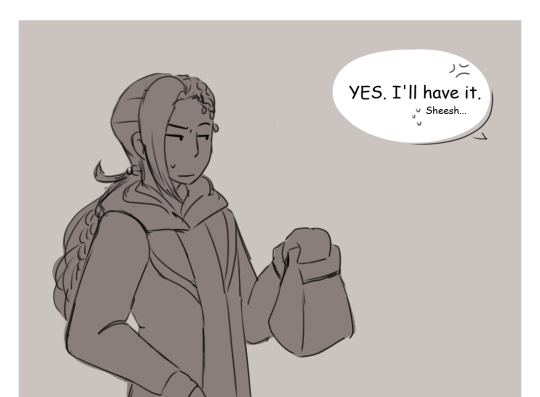
jamil is so silly
#he's still in denial your honor#[—✦-#-✧ my art#-✧ comic#twst art#twisted wonderland#twst#jamil viper#jamil x yuu#twst oc x canon#twst yuu#twst yuusona#(💜) yuusha#(💜) curry noodles#-✦—]#also finally making my own jamiyuu content ack#i imagine this is how he show his affection (?)#very subtle
2K notes
·
View notes
Text
"House isn't my— we're not gay."
"if you die, I'm alone."
"probably because of my secret, very unconscious desire to get Wilson into my bedroom."
"you were thinking about Wilson while we were having sex? That's so cool, me too!"
"I thought your Wilson fetish was over?"
"I need you to tell me that you love me."
"you have everything you need right here. We both do."
"I just want to enjoy my last five months with family and friends." "Friends or friend?"
"what does that mean? You're done with Wilson? As long as Wilson is alive, you're not done with Wilson."
"I want a threesome." "Shouldn't we try a twosome first?"
"I'm dead, Wilson. How do you want to spend your last five months?"

#chyanne speaks#these were just the ones of the top of my head#found this meme and wanted to use it#bc them bitches be gay!!!!#denial is a river in egypt#you and your bestie are GAY#house md#hate crimes md#hilson#gregory house#james wilson#remy thirteen hadley#chris taub#lisa cuddy#amber volakis
1K notes
·
View notes
Text
19Oct24
No matter how mad the word made us, It always held hope — a “hiatus.”
I’m sad for so many reasons — the fundamental sadness of death, and at such a young age; having to process the mortality of someone so extraordinary it seems they should transcend a fate as ordinary as dying; aching for his family and friends; angry that he had to navigate such a cruel world, one that continues to disrespect him in death. Yes, Liam was damaged and in turn damaged others; he had demons to face and amends to make — I like to think he would have, given a chance. His talent was so immense, and there was so much more to come. I believe he would have found a way to redemption, and then had such a beautiful renaissance.
The joy of being a 1D fan has always been policed and mocked. We’ve so frequently been laughed at, dismissed for the intensity of our love for the band. And now, the world wants to do the same with our grief, questioning its legitimacy, trivializing our feelings. But this loss is real. And this grief is valid.
And the grief of losing Liam is compounded by the grief of losing so much else. He wasn’t just a celebrity. They weren’t just a boyband. He was an integral part of an integral part of our formative years — no matter how old we were when we found them. So many of us are the people we are in part because of the people they are. Were. We’ve lost a beloved one, we’ve lost innocence, we’ve lost inspiration, we’ve lost a piece of our foundation.
We’ve lost hope.
It used to frustrate me, in retrospect, that they called it a “hiatus.” It felt dishonest — like a gentle lie to let us down easy. Why couldn’t they just say it was over? That being a boy band has a built-in shelf life, and it was time to explore solo careers. But now I understand the kindness in that word. For hope springs eternal, and it didn’t matter if it never came. All that matters was that it might. And “hiatus” wasn’t just for us; it held their optimism too. Especially Liam’s. It left the door open, even if only a crack, for the possibility of something more.
It’s been a remarkable gift to watch each one find his own path and his own voice. But when they announced a hiatus in 2015, they planted a seed of hope that someday we’d see the unrivaled magic of those boys on stage together again — the greatest team the world has ever seen. Maybe Zayn would join, probably not. Maybe it would’ve been a one-off thing for charity or a special anniversary. Maybe it would be in their 50s when the allure of easy money from a reunion tour was too tempting to resist. But surely, eventually, 1D would reunite in some capacity. I was excited to see how their once frenetic energy and youthful antics would meld with the mature solo artists they’ve become.
That hope sustained us through 18 months and eventually eight years, but now the hiatus is over. I would have happily clowned for every remaining day of my life than know this new certainty brought by the finality of Liam’s death. Maybe, someday, there will be a memorial performance. Maybe we’ll see three or four out of five come together to honor him — and what a poignant testament it will be that Liam was what could bring them together. Or maybe it will never feel right to them to take the stage without him, and that, too, will make all the sense in the world.
I wish I had an uplifting ending for this post. I don’t. I wake up and my first thought is “Liam isn’t here anymore,” and then I go about my day with that relentless realization lurking around the corner of every mundane task I do.
I haven’t been able to listen to their music yet. It’s a cruel trick that the thing that always brought comfort is now a trigger for grief. But I hope that will soon change. That, at some point, I’ll put on WMYB, get choked up at “You’re insecure” and second-guess my readiness. But then jump to History, and find solace in the lyrics that are currently rattling around my brain but aren’t ready to be heard yet: “This is not the end, this is not the end” … “We can live forever.”
❯❯❯❯
#rest in peace liam#liam payne#tw liam's death#trying to process the sad thoughts#don't read if your own sad thoughts are too much atm#i've moved from shock to sorrow and now to denial#none of it feels real#tw death
577 notes
·
View notes
Text

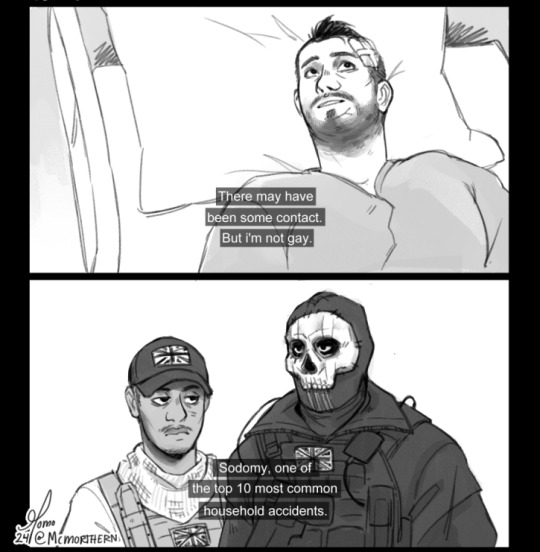
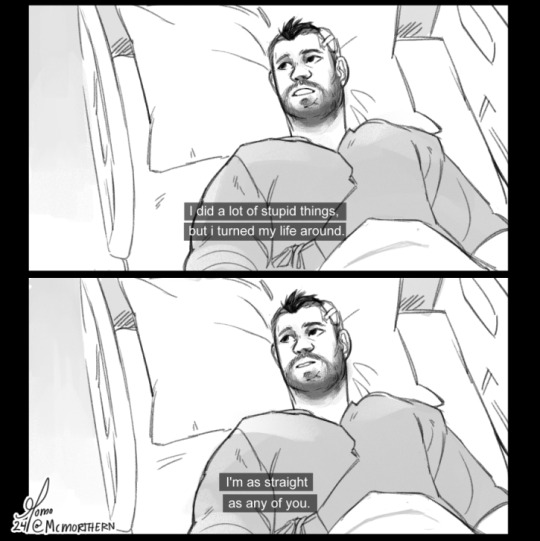
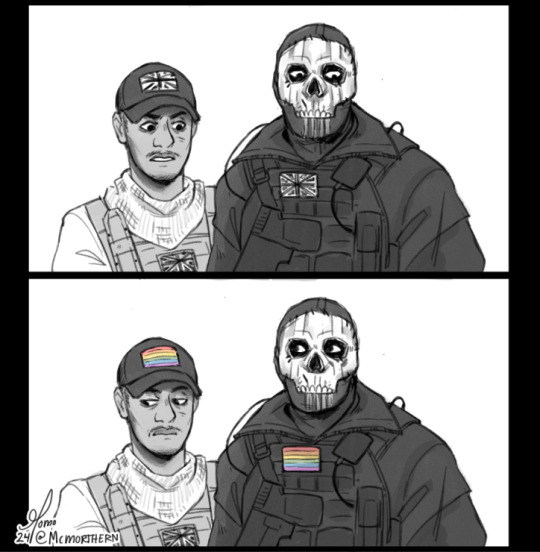
Redraw of that one House.md scene
#call of duty#cod mw2#cod mw3#call of duty modern warfare#john price#john soap mactavish#kyle gaz garrick#simon ghost riley#redraw#codmw#cod#they are gay your honor#soap in denial
1K notes
·
View notes
Text
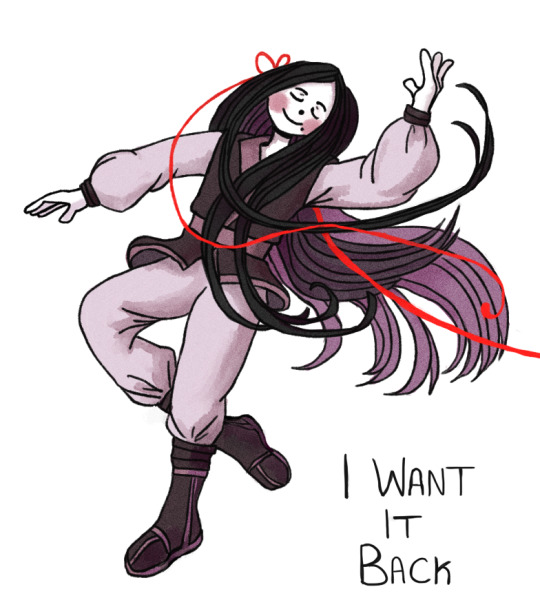
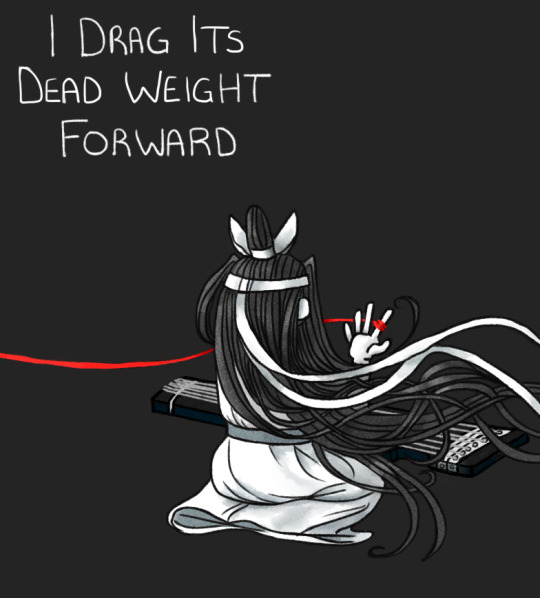
I want it back / I drag its dead weight forward.
#Better drawn mdzs#mdzs#wei wuxian#lan wangji#digital art#This was a style experimentation doodle that took on a life of its own.#In a way it is a great example of 'beautiful failure'. The original goal was to try a pure black and white contrast piece.#Which I very much failed at doing. Not quite ready for that! However what this turned into is something I like a lot!#Different but in a way that really pushed me as an artist. A little less simple; a little more proportional.#I was also recently thinking about LWJ's grieving that we only catch glimpses of.#LWJ grieved his first love for 13 years. His love that was never reciprocated.#He chose to dedicate his heart to that mourning and most painfully of all - he did so knowing there was no end to that grief.#Wei Wuxian comes back to life in MDZS but that is an exception. Not the expectation.#He was dead. Not missing. Not 'maybe in hiding'. He was dead and his spirit unreachable.#Jiang Cheng went forwards with denial but LWJ takes that grief on. He copes by continuing to carry the weight with him.#Let me be clear. Neither are healthy approaches. It is a way to cope but it does not mean that is healing or healthy.#Grief is loved transformed but it is also about endurance and letting go. Grief can change you. You can also change your grief.#It isn't a good or evil thing to experience. It is just an experience.
953 notes
·
View notes
Text
Spencer vs. Emily’s reaction when a man flirts with them:

#denial is a river in Egypt your profilers a gay#emily prentiss#criminal minds memes#criminal minds#spencer reid#bisexual analysis unit
867 notes
·
View notes